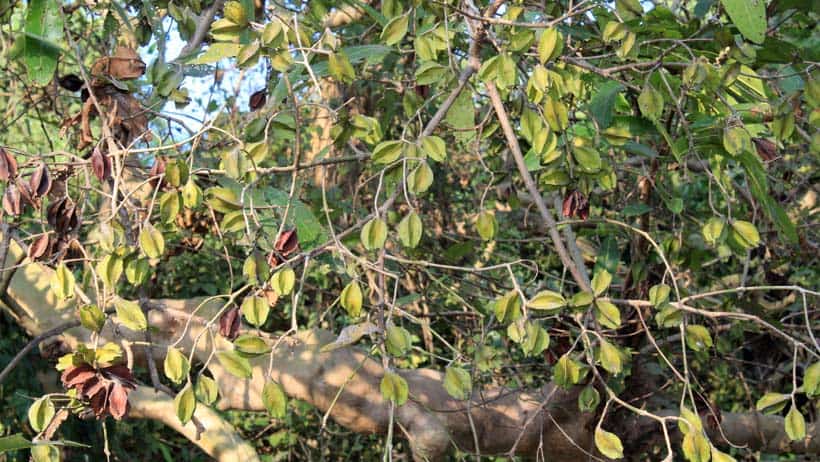
The name Arjuna is most often associated with the hero of the Mahabharata. A great and powerful warrior, Arjuna was one of the five heroic Pandava brothers who engaged in battle against their cousins, the Kauravas, on the famous battlefield of Kurukshetra.
Arjuna is considered the most important of the brothers, as it is his dialogue with Lord Krishna that makes up the bulk of the sacred text, the Bhagavad Gita. This conversation resulted in some of the most profound spiritual teachings in human history.
A powerful rejuvenative, the herb arjuna supports both the physical and energetic health of the body’s most vital organ: the heart. Just like the herb’s namesake, arjuna brings fortitude, strength, and protection.
What is Arjuna?
Literally, “arjuna” translates from Sanskrit as “bright,” “white,” “shining,” or “effulgent.” The arjuna (or arjun) tree is a very tall deciduous evergreen that can reach up to 100 feet and has shimmering bark that reflects the light. The tree is native to damp, sub-Himalayan regions in India and Sri Lanka where its health benefits have been celebrated for centuries. The red inner bark is a greatly prized cardiac therapy, with the ability to treat any nature of imbalance within the heart — physical or emotional.
But arjuna has many more therapeutic uses beyond its connection to the heart. It benefits the circulatory system, soft tissues, and blood health — from blood sugar levels to proper coagulation. Its affinity with the chest also makes arjuna beneficial to kapha-related stagnation in the chest or lungs, whilst its cooling properties promote balance in pitta dosha.
However, if used in excess, arjuna can be aggravating to vata dosha. Emotionally arjuna is said to soothe grief and sadness, restoring balance and inspiring confidence. Energetically, arjuna is said to connect to the heart chakra, increasing one’s inherent bhakti (love and devotion).
Health Benefits
- Rejuvenative tonic for the heart
- Tones the heart muscle
- Maintains healthy cholesterol levels
- Maintains healthy blood pressure
- Accelerates blood clotting to aid speedy wound recovery
- Supports and strengthens the circulatory system
- Promotes emotional balance; helps relieve grief and sadness
- Tonic for the lungs
- Combats asthma
- Protects DNA from damage by toxins such as adriamycin
- Promotes bone density
- Rejuvenates soft tissues
- Reduces body temperature during fever
- Cooling for pitta dosha
- Balancing for kapha dosha
- Supports the digestive system
- Improves liver and gallbladder function
- Helps to flush out kidney stones
- Soothes skin inflammation
When to Take Arjuna
If you are looking to strengthen the heart muscle, support healthy blood pressure and cholesterol levels, and boost circulation, arjuna is a very useful ally. Similarly, it is very pacifying to aggravation of kapha in the lungs and aggravation of pitta on the skin.
Arjuna can be taken daily as a support to the blood and heart or can be used seasonally or at times of need. For example, those with a kapha-predominant constitution may choose to take arjuna during the spring season, when kapha is more likely to become aggravated. Arjuna is also known to be soothing for the emotions of the heart, particularly sadness and grief. Therefore it can be used as an emotional tonic during times of need.
How to Use It
Traditionally, arjuna is taken in its powdered form, as its bitter and astringent taste kick starts the healing process. The powder can be mixed into ghee, warm water, or milk with honey. However some people prefer to use a liquid extract for convenience and quicker assimilation.
As well as being taken on its own, arjuna can be found as an ingredient in many herbal blends, particularly those directed towards heart health. Most often these blends will come in tablet form.
Contraindications
For those with a vata-predominant constitution, arjuna may cause aggravation if taken in excess. In extremely high doses, arjuna can limit the function of the thyroid gland and cause problems with the liver.
If you are pregnant, nursing, taking medication or dealing with a medical condition, it is always advised to consult your health care practitioner before adding a new herb to your regimen.